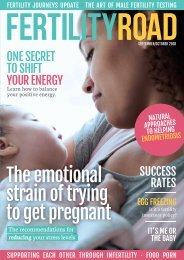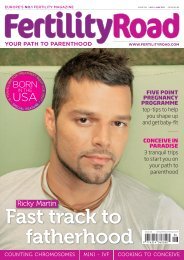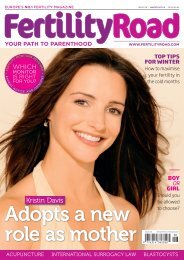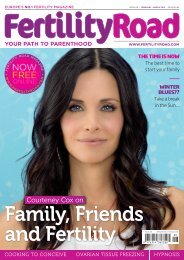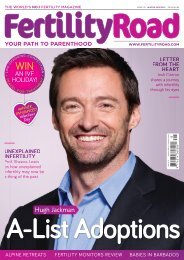Fertility Road Issue 03
Create successful ePaper yourself
Turn your PDF publications into a flip-book with our unique Google optimized e-Paper software.
FERTILITY ROAD | |IRTSA<br />
NEW SCIENCE<br />
REPRODUCTIVE<br />
OPTIONS FOR<br />
HIV-POSTIVE<br />
PARENTS<br />
By Lyudmyla Smahina, CEO<br />
of International Reproductive<br />
Technologies Support Agency.<br />
The Invention of antiretroviral therapy has allowed<br />
HIV-infected people to enjoy an active lifestyle for a<br />
longer time and think about having children. Up-to-date<br />
reproductive medicine has also highlighted this group<br />
of patients. On top of that, long-awaited parenthood is now<br />
possible not only for HIV-positive couples (one partner infected)<br />
but for concordant parents (both partners infected) as well.<br />
For an infected man, insemination or IVF with a donor sperm<br />
is considered the safest. However, there is a problem of legal<br />
limitations imposed on such practices in many European countries.<br />
Also, it is often more intolerable for a man to recognize the absence<br />
of genetic relation to a child than it is for a woman. If to consider<br />
adoption as an alternative option then HIV infection complicates<br />
the procedure or in some cases can make it absolutely impossible.<br />
Other more reasonable ways tend to include various methods of<br />
artificial fertilization depending on the reproductive health of a<br />
couple. These cover intrauterine insemination (IUI), in-vitro fertilization<br />
(IVF) or ICSI. The latter two methods are considered more<br />
efficient as they eliminate close contact between an egg and a sperm.<br />
Techniques for sperm clean-up represent distinctive feature of<br />
the programmes. First inseminations using cleaned sperm cells<br />
were performed in Italy (1989) and Germany (1991). From 1991<br />
to 20<strong>03</strong> application of these methods gave birth to 500 children.<br />
Sperm washing is a term used to describe the process of cleaning<br />
masculine germ cells from the virus as it is only the surface of the<br />
sperm and not the sperm itself that is affected. Research has shown<br />
that virus infects only plasma sperm, core cells and immobile<br />
sperm cells. Mobile vital sperm cells are not infected. To detect<br />
such sperm cells, sperm Is mixed with a special liquid with<br />
high density. Then, it is divided into three elements and place<br />
into a medical centrifuge. Adding salt solution results in the<br />
emerging of active sperm cells on the surface which is then taken for<br />
fertilization preceded by tests on the presence of the virus applying<br />
high-sensitive methods (sensitivity threshold is 10 pattern/ml).<br />
However, there is a possibility that HIV content in the material<br />
can be lower than the sensitivity threshold. Therefore, one can<br />
not guarantee that this method is 100% safe.<br />
Unfortunately, the sperm washing method is not accessible in every<br />
country. In Great Britain, there are only a few clinics that deal with<br />
this, while France has recently approved the right of HIV-infected<br />
people for IVF. The same law has been introduced in Italy<br />
and Spain as well. In Germany this service is even included in<br />
medical insurance while in Sweden it is completely controlled<br />
and sponsored by the government.<br />
As far as a HIV positive woman is concerned, there is a chance<br />
of a so-called vertical virus transference from mother to a child<br />
which is possible during pregnancy child delivery, and breast<br />
feeding. In 25-40% of such cases HIV is transferred during gestation.<br />
This becomes possible because of vulnerability of the placental<br />
barrier in the result of which the virus can penetrate from<br />
the mothers blood into that if the child.<br />
According to the World Health Organisation a chance of vertical<br />
transference amounts to 20-30%. Under conditions of special<br />
nursing and feeding with milk mixtures the risk decreases to<br />
2-5%. Less continual delivery as well as C-section operations are<br />
also recommended for such obstetric patients.<br />
Thus, the success of the programme depends on three factors:<br />
antiretrovirus therapy, planned cesarean operation and artificial<br />
feeding. However, such medical services are normally difficult to<br />
receive. Many European medical centers offer IVF services only<br />
for those couples where a man is an infected person. Significant<br />
challenges are also faced by concordant couples.<br />
It would be appropriate to note ethical, psychological and social<br />
aspects of implementation and outcomes of highly mentioned<br />
reproductive programs. Many people are curious how living with<br />
one or two HIV-positive parents can influence the child. There<br />
is no doubt that such couples will be very careful in their daily<br />
routine doing their best to avoid any chance of infection.<br />
For more information about<br />
IRTSA’s services, please contact:<br />
Phone: +38 (044) 223-51-13<br />
E-mail: info@irtsa.com.ua<br />
www.irtsa.com.ua/en<br />
www.fertilityroad.com<br />
61



